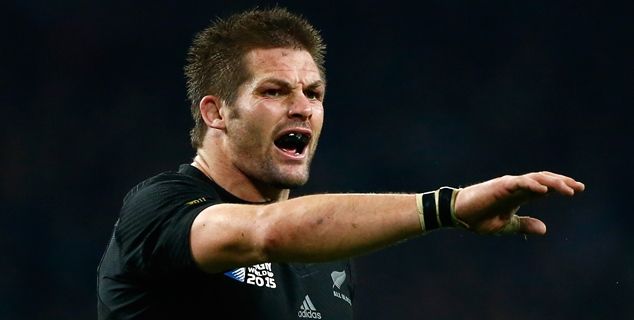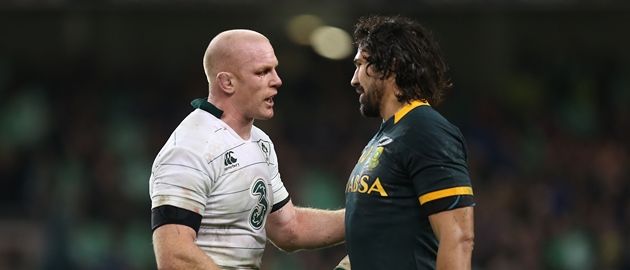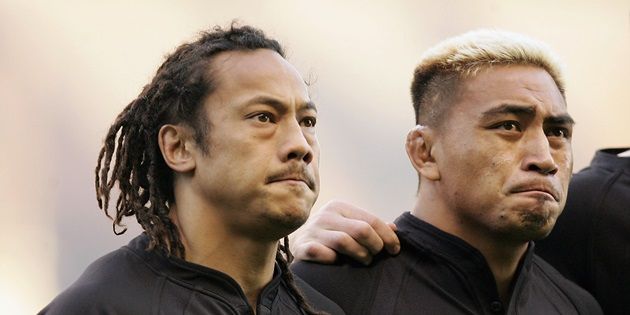

Share
10th August 2018
12:16pm BST

 The most glaring omission of any player currently not included in the Hall of Fame.
McCaw captained New Zealand to two Rugby World Cup wins, he holds the all-time record for international rugby games played with 148 caps, he has won three World Rugby Player of the Year awards and he might just be the greatest player to have ever played the game.
If he wasn't eligible this year, an exception surely should have been made in previous years.
2. Dan Carter
International rugby's all-time leading points scorer and like McCaw a two-time World Cup winner with three World Rugby Player of the Year awards.
Another player who should have been an automatic selection and a very strong candidate for an exception in previous years.
3. Paul O'Connell
A Lions captain, a multiple Six Nations and Grand Slam winner, O'Connell is one of the greatest players in the history of Irish Rugby and he retired from the sport at the end of the 2015 Rugby World Cup after a hamstring injury ultimately ended his international and professional career.
4. Victor Matfield
The most glaring omission of any player currently not included in the Hall of Fame.
McCaw captained New Zealand to two Rugby World Cup wins, he holds the all-time record for international rugby games played with 148 caps, he has won three World Rugby Player of the Year awards and he might just be the greatest player to have ever played the game.
If he wasn't eligible this year, an exception surely should have been made in previous years.
2. Dan Carter
International rugby's all-time leading points scorer and like McCaw a two-time World Cup winner with three World Rugby Player of the Year awards.
Another player who should have been an automatic selection and a very strong candidate for an exception in previous years.
3. Paul O'Connell
A Lions captain, a multiple Six Nations and Grand Slam winner, O'Connell is one of the greatest players in the history of Irish Rugby and he retired from the sport at the end of the 2015 Rugby World Cup after a hamstring injury ultimately ended his international and professional career.
4. Victor Matfield
 One of the greatest locks in the history of the sport, Matfield retired from international rugby in 2015 with a World Cup winners medal, two Tri-Nations trophies and a series win over the British & Irish Lions. Possibly the best line-out jumper to have ever played and should be another automatic selection.
5. Schalk Burger
The 2004 World Rugby Player of the Year, Burger was a phenomenal flanker and played 86 games for the Springboks before his retirement from international rugby in 2015.
Another member of South Africa's 2007 Rugby World Cup winning squad and another player who will surely be in line for future induction.
6. Doug Howlett
Howlett is New Zealand's all-time leading try scorer with 49 tries in 62 matches for the All Blacks.
The winger won five Tri-Nations titles in international rugby, one European Cup with Munster and is also the Auckland Blues all-time leader in tries scored with 55 tries in 97 matches for the Super Rugby side. One of the best finishers in the history of the sport.
7. Fourie du Preez
A two-time World Rugby Player of the Year nominee, du Preez was one of the best players in South African Rugby history and a superb scrum-half.
The longtime Bulls half-back was capped 76 times by the Springboks over 11 years and retired from international rugby at the end of the 2015 Rugby World Cup.
8. Tana Umaga
One of the greatest locks in the history of the sport, Matfield retired from international rugby in 2015 with a World Cup winners medal, two Tri-Nations trophies and a series win over the British & Irish Lions. Possibly the best line-out jumper to have ever played and should be another automatic selection.
5. Schalk Burger
The 2004 World Rugby Player of the Year, Burger was a phenomenal flanker and played 86 games for the Springboks before his retirement from international rugby in 2015.
Another member of South Africa's 2007 Rugby World Cup winning squad and another player who will surely be in line for future induction.
6. Doug Howlett
Howlett is New Zealand's all-time leading try scorer with 49 tries in 62 matches for the All Blacks.
The winger won five Tri-Nations titles in international rugby, one European Cup with Munster and is also the Auckland Blues all-time leader in tries scored with 55 tries in 97 matches for the Super Rugby side. One of the best finishers in the history of the sport.
7. Fourie du Preez
A two-time World Rugby Player of the Year nominee, du Preez was one of the best players in South African Rugby history and a superb scrum-half.
The longtime Bulls half-back was capped 76 times by the Springboks over 11 years and retired from international rugby at the end of the 2015 Rugby World Cup.
8. Tana Umaga
 Umaga played 74 times with the All Blacks and captained the side on 21 occasions with a 85.71% win record. He played most of his career in the centres and on the wing and was nominated for the World Rugby Player of the Year in 2005.
9. Imanol Harinordoquy
A two-time World Rugby Player of the Year nominee, Harinordoquy was a constant presence in the great French teams of the last decade and retired from international rugby in 2012.
He was a member of the French team that finished as the runner-up to hosts New Zealand in the 2011 Rugby World Cup Final.
10. Neil Jenkins
Jenkins trails only Carter and Wilkinson for points scored in international rugby. He was the first ever rugby player to break the 1,000 international points mark with a 28-point haul featuring a Full House of a try, conversion, drop-goal, and penalty against France in Paris.
During his 87 caps for Wales he scored 1,049 points (11 tries, 130 conversions, 235 penalties and 10 drop goals) and a further 41 points (1 conversion and 13 penalties) during his four caps for the British and Irish Lions for a grand total of 1,090 points.
A full list of inductees can be viewed here.
Umaga played 74 times with the All Blacks and captained the side on 21 occasions with a 85.71% win record. He played most of his career in the centres and on the wing and was nominated for the World Rugby Player of the Year in 2005.
9. Imanol Harinordoquy
A two-time World Rugby Player of the Year nominee, Harinordoquy was a constant presence in the great French teams of the last decade and retired from international rugby in 2012.
He was a member of the French team that finished as the runner-up to hosts New Zealand in the 2011 Rugby World Cup Final.
10. Neil Jenkins
Jenkins trails only Carter and Wilkinson for points scored in international rugby. He was the first ever rugby player to break the 1,000 international points mark with a 28-point haul featuring a Full House of a try, conversion, drop-goal, and penalty against France in Paris.
During his 87 caps for Wales he scored 1,049 points (11 tries, 130 conversions, 235 penalties and 10 drop goals) and a further 41 points (1 conversion and 13 penalties) during his four caps for the British and Irish Lions for a grand total of 1,090 points.
A full list of inductees can be viewed here.Explore more on these topics: